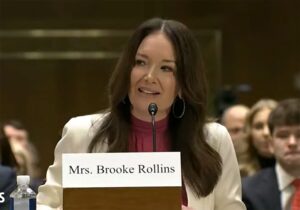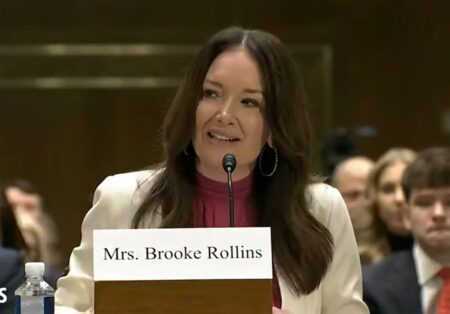By Cami Koons
Research from The Nature Conservancy found current clean energy tax credits, if kept in place through 2032, would add more than $238 million in annual economic value to Iowa.
Some folks fear that the tax credits will be slashed by congressional leaders as they stare down hefty budget cuts and eye Biden-era environmental policies. But advocates of the clean energy credits say they are essential to reaching American energy dominance.
The study looked at clean energy tax credits impacting transportation, power generation, industry, and buildings. Those categories comprise sectors from renewable vehicle fuels, to carbon sequestration, to home solar installations, and electric vehicles.
Amber Markham, director of external affairs and climate for The Nature Conservancy, said most of those tax credits were established with bipartisan support but are under attack by Republican officials because they were extended by the Biden administration’s Inflation Reduction Act.
“Rather than just lumping them all together and throwing them out, because somehow it seems like it’s an environmental thing … we need to really, take not a sledgehammer approach, but a scalpel approach, and go in and look at each of them and their impact and what makes the most sense to keep and support,” Markham said.
According to the study, the tax credits in the power category, followed by the industry category, account for the greatest share of annual economic value added to Iowa.
The tax credit programs analyzed in the study include:
Power:
- 45Y: credits for energy generated with little to no greenhouse gas emissions.
- 48E: a tech-neutral credit for energy generated with little to no greenhouse gas emissions.
- 45U: credits for nuclear energy facilities with zero emissions.
Industry:
- 48C: credits for projects that expand clean energy manufacturing or recycling.
- 45X: credits for solar and wind energy components.
- 45V: credits for clean hydrogen production.
- 45Q: credit for projects that sequester carbon dioxide by injecting it into underground geological formations.
Buildings:
- 25D: credits for residential clean energy updates such as solar panels, wind turbines, etc.
- 25C: credits for residential energy efficiency updates such as new windows, doors or insulation.
- 179D: credits for energy efficiency updates to commercial buildings.
- 45L: credits for building or reconstructing energy efficient homes.
Transportation:
- 45Z: credits for domestically produced fuel, including sustainable aviation fuel, with lifecycle greenhouse gas emissions below a certain level.
- EV tax credits: credits for individuals who purchase electric plug in or fuel cell vehicles.
Markham said cutting the tax credits now would be like “pulling the rug out from under” the individuals, business owners, and industries that have invested in this technology with the expectation of the tax credits.
Monte Shaw, executive director of the Iowa Renewable Fuels Association (IRFA), said this is true for ethanol facilities in Iowa, which he said have invested “tens of millions of dollars” to be able to receive 45Z tax credits for manufacturing sustainable aviation fuel.
“That is why we’re fighting so hard to push back against the people who [want to] rip it out,” Shaw said. “These facilities made good-faith investments based on the law of the land.”
Conversely, opponents of the carbon pipeline projects in Iowa are gathering signatures on a petition, specifically urging Senators Joni Ernst and Chuck Grassley to cut the 45Q tax credits, which incentivize the carbon sequestration pipelines.
IRFA and other commodity groups associated with the ethanol industry have been pushing for final guidance on the 45Z program, which Shaw said would said is “the best tool” to “maximize the Midwest contribution to American energy dominance.”
A comment period for 45Z guidance closed April 10. Shaw said the association asked for a long-term extension of the program and for the inclusion of the climate-smart agriculture practices. He said the climate-smart agriculture practices program would help the ethanol facilities meet the low-emission standards it needs to qualify for 45Z, and it would allow farmers to compete in a global market by quantifying the carbon impacts of regenerative farming practices.
Shaw said it seems the president doesn’t care about the impacts these tax credits have on the reduction of greenhouse gas emissions but he should care about the economic benefits they represent to the country.
“If you want to get to American energy dominance, this is a tool that’s right here, in law, that can be implemented aggressively, that will achieve your American energy dominance goals,” Shaw said, speaking specifically about 45Z.
Another study, released by the Clean Energy Buyers Association, found that residential energy prices in the U.S. would increase by nearly 7% in 2026 if the tax credits were done away with.
Markham, with TNC, said renewable energy needs to be in the mix to meet American energy demand, which is expected to increase by at least 2% each year in 2025 and 2026.
“We know that more energy is needed across our nation, so it’s not an either-or; it’s an all-of-the-above approach that we need to be taking,” Markham said.
U.S. Rep. Mariannette Miller-Meeks of Iowa is one of a group of GOP lawmakers advocating for the energy tax credits. Miller-Meeks testified in favor of the credits in the House Ways and Means Committee, urging her colleagues to develop an “any of the above” strategy to meet energy demands.
“Our energy sector faces significant challenges that demand bold action,” Miller-Meeks said.
She noted the Inflation Reduction Act of the previous administration created some “important energy tax credits that are already driving transformative investments across the U.S. energy sector.”
Miller-Meeks along with 20 other Republican lawmakers wrote to the House Ways and Means Committee Chair Rep. Jason Smith (R-Mo.) asking that any changes to energy tax credits be done in a “pragmatic fashion” without “undoing” programs that are already promoting energy innovation and lowering utility costs.
Markham said the environmental group was grateful for the support of the Iowa representative.
“We need more Republicans to stand up and support these clean energy tax credits, specifically because they are bipartisan, they always have been, until now,” Markham said.
The U.S. House adopted a budget resolution April 10, just before leaving for a spring recess, that allows both chambers to work on a reconciliation package. Per the adopted resolution, Congress must make $1.5 trillion in cuts to federal spending.
Iowa Capital Dispatch is part of States Newsroom, a network of news bureaus supported by grants and a coalition of donors as a 501c(3) public charity. Iowa Capital Dispatch maintains editorial independence. Contact Editor Kathie Obradovich for questions: [email protected]. Follow Iowa Capital Dispatch on Facebook and Twitter.



:max_bytes(150000):strip_icc()/supreme-court-USDA-9e398b0292044181a1f2335120be7c71.jpg)



:max_bytes(150000):strip_icc()/SolarfarmUSDA-68f90d009c14441493410c34a4f1f46b.jpg)


:max_bytes(150000):strip_icc()/Lee-Lubbers-planting-John-Deere-tractor-planter-South-Dakota-5e0c6bc16a7b4f10a790335ee5df3803.jpg)
:max_bytes(150000):strip_icc()/2210-08-096_wheat-f2aff7062b69433ab8ef6361993a9436.jpg)
:max_bytes(150000):strip_icc()/IMG_9027-2048x1205-cc7c182458fb4cc9b8be48bdb0097de2.jpg)